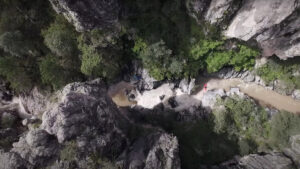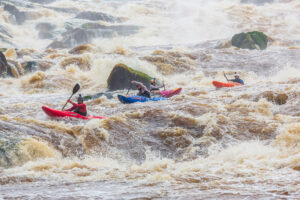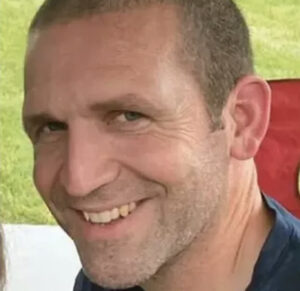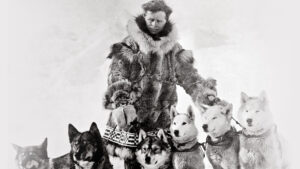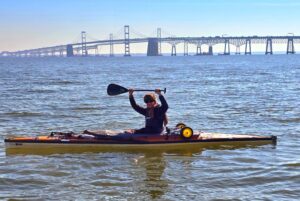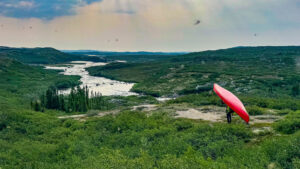Sixty-one-year-old Dermot Higgins got the idea to canoe 3,150 kilometers along one of North America’s remotest rivers from a drinking buddy.
The rest — Higgins’ “seriously overweight and quite unfit” condition, nude paddling, a bear attack, and his fraught personal history — is history.
The Irishman became maybe the least likely paddler on record to traverse the Yukon River from its headwaters near Whitehorse, Canada to the Bering Sea. The journey took him 56 days, and he finished on Aug. 25.
Higgins chose a late start date for the adventure, tempting the ingress of the Yukon’s punishing fall.
But that reflected his preparatory attitude toward the endeavor in general.
Not your average long-distance paddler
“I’m not the least bit mentally or physically prepared for what lies ahead,” he wrote on Facebook at the time he embarked. “To be really honest, I’m quite scared.”
Higgins was in as diminished physical condition as he said he was. According to The Globe and Mail, he really did agree to the trip in a bar. Celebrating this past St. Patrick’s Day in his hometown of Skerries, Ireland, he drew inspiration and courage from a visiting Canadian.
Several potential partners rallied around Higgins — but all dropped out before July 1, his launch date.
Understandably. Completing the Yukon River is challenging, even for hardened paddlers. The territory bristles with unpredictable weather and sheer remoteness. The Yukon fluctuates in its course, and getting lost on the water is a legitimate hazard.
Higgins would go alone, with supplies including $6,000 (minus airfare and a GPS tracker), a 17-foot aluminum Grumman canoe and scant supplies he would have lacked except thanks to a benefactor. He also almost totally lacked paddling experience, and he would be alone on the river with his thoughts.
These could be significant or even intrusive. Higgins had brought his long marriage to an end at 55, following a bipolar diagnosis. He once attempted suicide, The Globe and Mail reported, and has fought to maintain his mental health ever since. But the retired schoolteacher found nature soothed him, so he paddled out.
And almost instantly ran into trouble.
Bears, baggage, beers
Eight days into the trip, Higgins cleaned up food scraps at an abandoned campsite. He then made himself at home at the site, pitched his tent, and called it a night. He awoke with the tent material grazing his face from heavy scratching on the outside.
In a calamity, both he and the black bear outside reacted strongly. Higgins fired a blast of bear spray through the tent wall — which deflected back into his face.
He lost consciousness and woke up shortly afterward covered in vomit.
Higgins almost threw in the towel then and there. But more strong drink encouraged him, and this time he found keener comrades to join him. A group of German paddlers recruited the down-but-not-out paddler to join them, and the group traveled together all the way to the Arctic Circle.
Around 700km into his journey, it appeared Higgins was starting to settle in.
“I’m quite surprised at how quickly my paddling stroke and strength have improved in only a few weeks and I’m now able to put in really long paddling days without feeling completely fatigued afterward,” he wrote on July 22.
Higgins also consistently expressed interest in meeting First Nations peoples and learning the history of the areas he passed. Higgins cut his course between communities by some force of intuition and crude mapping. He had only brought a basic map of Alaska along with him. It’s miraculous considering the Yukon’s sometimes maze-like course.
But what can a humble paddler do? He followed the sun, and when the weather was fair, he went shirtless. When it was even fairer, he stripped down even more.
It was a good thing he enjoyed it. Once, a few hundred kilometers from the Yukon River’s mouth at Emmonak, Alaska, it looked like his luck might run out. The channel is wide there, and winds can be fierce. Higgins once took a chance to dart across a channel and almost paid for it.
Calm conditions gave way to a sudden squall, which caught him midway across. The waves swamped his canoe, and he plunged into the frigid water.
“I didn’t panic, and I knew, of course, that there was no chance of rescue. So I assessed the situation as calmly as I could and acted swiftly,” he wrote on Facebook.
Reportedly reciting his father’s favorite prayer, he hauled his swamped canoe several hundred meters to the shore.
He didn’t linger there.
“After rearranging things in the boat a little, I continued on paddling for another few hours. I felt lucky to be alive! I was so relieved that I’d decided to pull on the life jacket,” he wrote. “Naturally, I was totally exhausted, both emotionally and physically.”
‘Committed’
After two more weeks of colorful adventure, Higgins pulled into Emmonak, safe and sound. Finding favorable treatment from the locals, he devoured a “mouthwatering” burger and fries with a few beers, then tucked into a “beautiful, cozy room” at a local guesthouse.
You can read more about Higgins’ adventure in his extensive Facebook posts. And that’s not all — the paddler announced he has “committed” to publishing a book that will consolidate the main episodes and many others that now remain known only to him.

